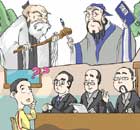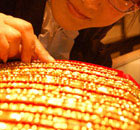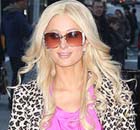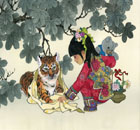Science and Health
Age of mother affects child's autism risk - study
(Agencies)
Updated: 2010-02-09 10:27
 |
Large Medium Small |
CHICAGO - Being an older mother significantly increases the risk of having a child with autism, but being an older father only increases the risk when the mother is under the age of 30, U.S. researchers said on Monday.
They found that a 40-year-old woman's risk of having a child later diagnosed with autism was 50 percent greater than that of a woman between 25 and 29.
But being an older father -- 40 or older -- only contributes significantly to autism risk when the mother is under 30.
"The older the mother, the more the risk that the child will develop autism, regardless of whether the father is young or old," said Irva Hertz-Picciotto of the University of California Davis MIND Institute, who worked on the study published in the journal Autism Research.
The findings contradict a 2006 study of children born in Israel that suggested paternal age played a much larger role.
"There has been a debate over whether it is maternal or paternal risk. A lot of people were thinking it's not really mom's age," Hertz-Picciotto said in a telephone interview.
Researchers and policymakers are increasingly looking for causes to explain the growing numbers of children diagnosed with autism, which affects 1 percent of U.S. children.
There is no cure for autism, a spectrum of diseases ranging from severe and profound inability to communicate and mental retardation to relatively mild symptoms such as with Asperger's syndrome.
The current study, which incorporates data on 4.9 million births and 12,159 autism cases in California, helps to clarify the contribution of age from both parents.
"We have such a very large database we were really able to disentangle the mother's age very well," Hertz-Picciotto said. This can be a challenge because older mothers and fathers tend to have children together.
"We found it does vary for the father, but not for the mother," she said.
For example, among babies born to mothers under 25, children whose father was over 40 were twice as likely to develop autism as those whose father was between 25 and 29.
This could be because when both parents are older, the risk conferred by the father is outweighed by the risk from the mother, Hertz-Picciotto said.
OLDER PARENTS
She said the point of the study is not to blame parents, but to gain clues about what is going on in older parents that could increase a child's risk of developing autism.
Older parents, for example, are more likely to have infertility problems and have used fertility treatments; the mothers are more likely to have autoimmune conditions, including gestational diabetes; and both have accumulated more toxins over their lifetimes, so the sperm and egg are more likely to have some changes that could increase risk.
"We see these age findings as clues for where to look next," Hertz-Picciotto said.
Autism researchers are looking at a broad range of potential environmental factors, including household products, medical treatments, diet, food supplements and infections.
And the National Institute of Mental Health, one of the National Institutes of Health, is looking at potential genetic causes of autism and has plans to sequence the entire genomes of hundreds of children and their parents to gain a better understanding of the role genes play.






